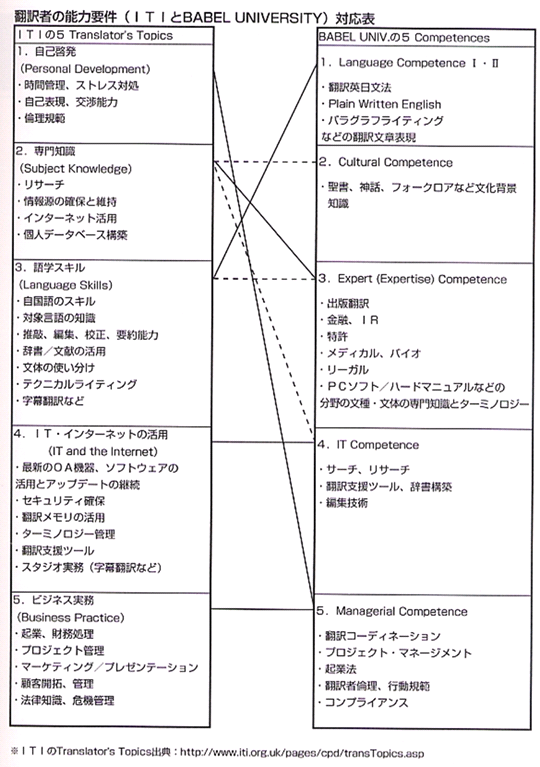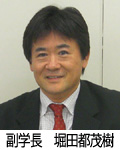一昨年、オバマ大統領がCBEという新しい教育形態も連邦奨学金の対象にすると議会で発表、下院を通過し、米国ではCBEは教育の新しい潮流になっていると言います。 CBEとはCompetency Based Education(CBE)、教材、教室、単位、修学時間、修学年限、単位当たりの学費といった旧来の教育の枠組みを越えて、目標とするCompetency、すなわち、知識、能力、態度といった統合的目標に基づいて学習効果を評価、達成しようとする試みです。従って、学習者主体の教育の自由化を志向していると言われています。 旧来の言い方であれば読み、書き、そろばん。最近であれば問題解決型学習、アクティブラーニングにも関係が深い、言わば知識教育からの脱却と考えられるでしょう。また、英国、フィンランド、ベルギー等で5歳児から義務教育化されているプログラミング学習もその路線と言えるかもしれません。 しかし、まだ、この定義も必ずしも固まっていない様ですが、米国ではすでに40以上の大学がCBEを看板にこの教育モデルを宣言していると言います。 こうした自由度の高い高等教育の制度が米国で普及しつつある背景には 従って、そのCompetency Based Education には、 バベルの翻訳専門職大学院(USA)をこれらの先行指標でざっくり自己総括すれば、こんな感じでしょうか。 1.翻訳者に求められるCompetence(Competency)を明確にしているか=Yes 2.カリキュラムはCompetenceに沿って組まれているか=Yes 3.評価の方法は単なる知識のAchievementではなくProficiencyを軸に行われているか=(Yes) 4.産学連携、キャリアプランと直結しているか=Yes 5.科目の選択の自由度があるか=Yes 6.メンター的な機能があるか=Yes 7.先行学習を評価しているか=Yes 以上、Competency Based Educationという米国の先端教育の流れに沿ってBABEL UNIVERSITY Professional School of Translationを自己評価してみました。 もちろん、私自身、CBEを深く学び、総括したわけではないのですが、新しい教育の潮流を私なりに考える絶好に機会となりました。 MOOCsの積極的活用に始まり、様々な課題が浮き彫りにされましたが、これを皮切りに翻訳専門職大学院の教育を次のステージにとの気持ちを新たにした次第です。 海外からも参加できるオンライン説明会 ◆ 卒業生のキャリアカウンセリングを担当する副学長が、入学及び学習システムからカリキュラム、各種奨学金制度、修了生の活躍、修了後のフォローアップなどを総合的に説明いたします。 ◆ 海外在住の方にも参加いただけるように、インターネットweb会議システムのZoomを使って行います。 奮ってご参加ください。Zoomのやさしい使い方ガイドはこちらからお送りします。米国教育の新潮流、CBEに学ぶ-型にはまった教育からの脱却

・MOOCs ( Massive Open Online Course )のような無料、且つ膨大な教材が解放されていること*MOOC: オンラインで公開された無料の講座群
・その背後にInstructional Designerのような教材制作のプロの出現していること
・旧来のキャンパススタイルの不自由な学習形態から、オンライン、そして、複合的なブレンディドラーニングが急激に増加したこと
・また、これらにより人々が様々な学習形式で学ぶようになったこと
等があると言います。
・教材より評価主体、評価重点
・資格認定試験との連携
・産学連携、キャリア重視の教育
・自由度が高い科目選択
・教えるというよりメンター的指導を重視
・先行学習評価を加味、すなわち実績を考慮
等の特色があると言います。
※別表参照(ITIはThe Institute of Translation & Interpreting 英国の翻訳協会)
一般社団法人日本翻訳協会の各種資格試験(5段階評価)と連動、そして、資格認定を単位として認めている
大学院がバベルグループのビジネス翻訳事業、翻訳出版事業、版権仲介事業とのアライアンスからなっている、いわばCorporate Universityの体裁をもつProfessional Schoolである
いずれの専攻においても他の専攻の科目を広く受講でき、且つ、翻訳出版ワークショップのようなプロジェクトに参画することも単位として認められている
すべての院生に専任のカウンセラーがアサインされ、別にキャリアコンサルティング、ラーニングカウンセリング、ITカウンセリングといった制度を用意している
過去の学習実績、過去の資格取得実績、過去の翻訳実績を単位として認定している
以上– 副学長から聞く - 翻訳専門職大学院で翻訳キャリアを創る方法


Last year, president Obama announced at Capital Hill that Competency Based Education (CBE), a new form of education, would be eligible for federal scholarships. Having passed through the House of Representatives, CBE is said to to be the new trend in U.S. education. CBE goes beyond the conventional education framework delineated by learning materials, classrooms, course credits, hours and terms of study, and credit fees. It is an attempt whose objective is based on the competency, an integration of knowledge, ability, and attitude, in evaluating and obtaining learning results.
CBE is intended to liberalize education for students going beyond the conventional learning methods of reading, writing, and arithmetic. CBE is also closely related to the recent problem solving and active learning methods, all of which are a form of breaking away from pure knowledge based education. For instance, such countries as England, Finland, and Belgium, require children to learn programming starting at the age of five. This kind of education runs along the same lines as CBE regarding objectives.
Although the definition for CBE is still being determined, 34 U.S. universities have declared that they are using this new education model.
The background behind this liberal system of higher education spreading throughout the U.S. is:
Massive Open Online Courses (MOOCs): Enormous amounts of free learning material which has been made available to the public.
Behind this is the emergence of instructional designers, who are professionals in creating learning materials.
The rapid increase in online and integrated blended learning rather than inconvenient conventional campus style learning.
People have begun learning in various styles due to the advancements listed above.
Competency Based Education includes the following characteristics:
1) Evaluation rather than learning materials; emphasis on evaluation.
2) Coordination with certification tests.
3) Cooperation between industries and the academic world; career-focused education.
4) High degree of freedom in choosing subjects.
5) Emphasis on mentoring approach to instruction rather than just “teaching”.
6) Prior learning assessments included; actual performance taken into consideration.
Since Babel Professional School of Translation (BUPST) is a professional school the basis of consideration differs to some degree, but the following is a brief self- summary based on the following viewpoints:
1) Does BUPST make clear the competencies that are demanded of translators? YES
*See attached table (the Institute of Translation and Interpreting (ITI) is a British translation association)
2) Are learning curriculums structured around these competencies? YES
3) Are evaluation methods centered around proficiency rather than mere intellectual achievement? YES
BUPST is associated with the Japan Translation Association’s various certification exams (five-step evaluation process). Course credits are given for certification.
4) Is learning at BUPST directly linked to cooperation between industry and academics, and to the career plans of students? YES
BUPST is made up of alliances with Babel Group’s business and publication translation businesses, copyright agents, and staffing agencies, making it a truly corporate university.
5) Is there a degree of freedom in selecting subjects? YES
No matter what major students choose, they can take courses in other majors, and can earn course credit by participating in projects such as translation publication workshops.
6) Do programs have a mentor-style approach? YES
All students are assigned to a full-time counselor. Career consulting, learning counseling, and IT counseling are also available.
7) Is prior learning evaluated? YES
Credits are given for prior studies, certifications, and translation work.
The points above summarizes how BUPST is in step with competency based education, the new trend in advanced education in the US.
While I have not studied about CBE in depth and do not provide a full summary here, learning about CBE has been a great opportunity for me to consider new trends in education.
I have brought up various issues beginning with the proactive use of MOOCs and other new advancements in hopes of renewing our thinking in taking professional schools of translation to the next level.

[:]]]>




